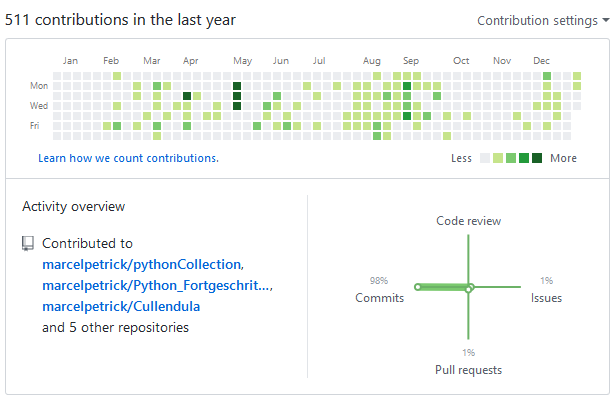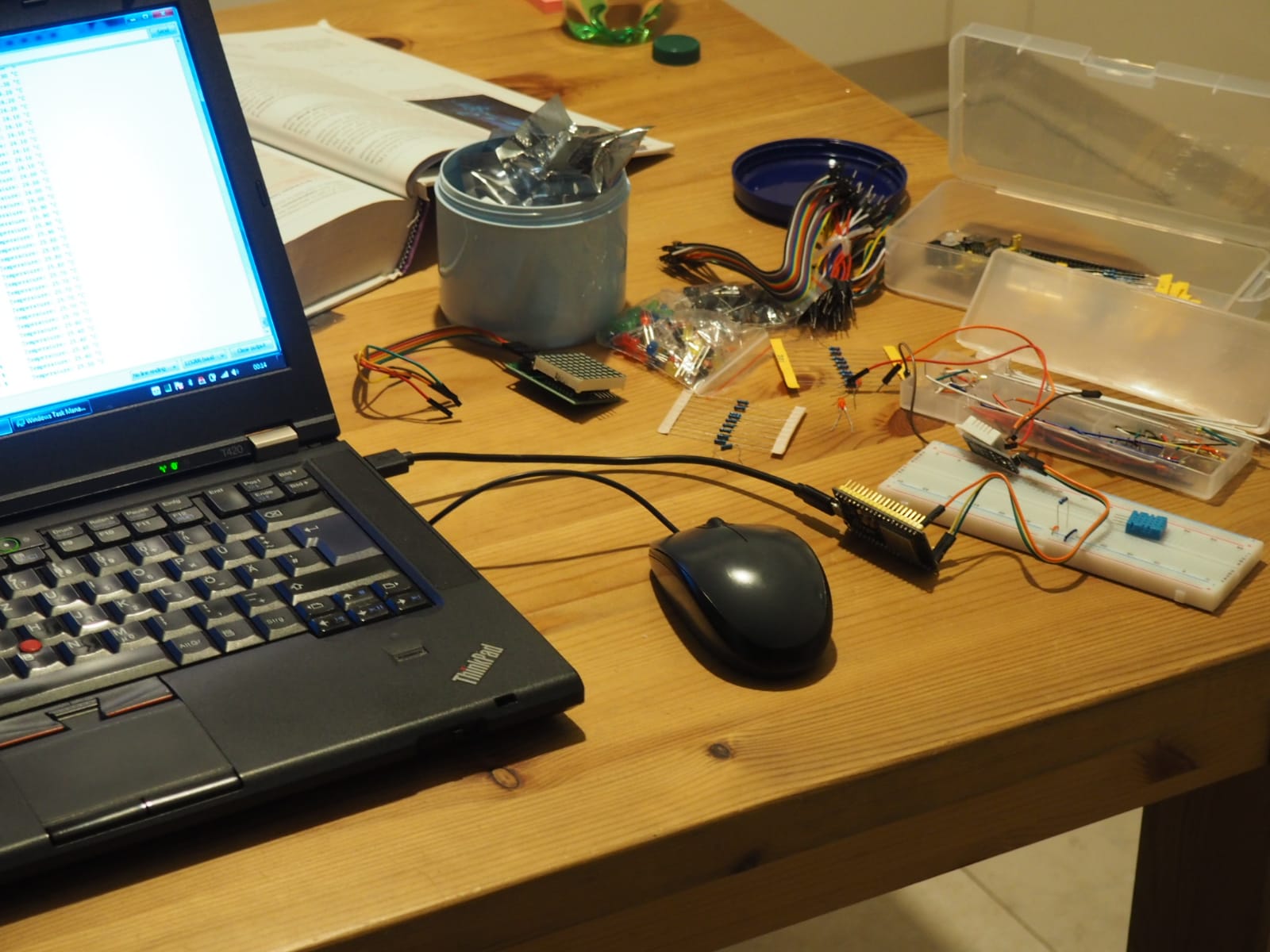you live and learn
SSH/SCP quick help
Challenge was to reconfigure a device, which has a Linux running on a TQ-board. Some files had to be adjusted.
Connect to the device:
|
1 |
ssh <usernam>:<ip> |
(Then enter password.)
List amount of free space:
|
1 |
df -K . |
Show target of symlink:
|
1 |
readlink <file> |
ESP32 and DHT22: temperature and humdity
To give my (non-existant) skills for microcontrollers and reading out sensor-values a kick-start, I decided to connect today an DHT11 to the ESP32.
So, at first I realized I have no clue how a breadboard works, then that I need a calculator to determine the resistors properly, then “how to determine the correct pin-numbering”, then … it did not work, no matter what I tried. The C++-code was the least issue. Several sources provide examples, also with webserver (looks like everyone ~stole~ got inspired from each other ..), but the read-out always failed.
Luckily I had two (a bit more ‘expensive) DHT22 at hand and it worked like a charm!
Lessons learned: 0. accept that you know nothing 1. reading and experimenting is fun 2. seeing finally a presentable result is great <3
Result:
* code
* output:
|
1 2 |
Humidity: 71.20 % Temperature: 24.40 °C Temperature (internal): 31.67 C |
Retrospective view at 2018
The first month of 2019 already passed. And we passed it with flying colors!
But let’s have a look at 2018 – a year full of challenges and success: I’ve worked full-time, organized and participated in advanced courses for Python and in Requirements Engineering (officially: IREB Requirements Engineering Foundation Level-approved) and pursued a new employment as software engineer.
And I wrote some software in my spare-time, as you can see in the graph for the public github-repositories. The gaps in the commits can be explained with the birth of my daughter and the time where I acquired the new job and moved nearly 900 km across the country. Yay! Nice personal projects were and are Cullendula and the Daily Coding Challenges, which I solve mostly with fully Unit-tested Python (3).

More new, hands-on knowledge was gained in the area of CMake and Qt-charts.
Well – 2018 was great. Let me make 2019 greater! 💪
Python-advanced level-seminar: lifelong learning
I am currently traveling back from my very first paid educational leave. Proper selection, arrangement and preparation lead to some awesome impressions: about the capabilities of Python and about the city of Detmold.
Daniel Warner lead us – an assembly of five inquisitive men in the age-range from 30 to 60 – along the details and
specialties of that programming language. I learned much, in detail:
- basic structures; list comprehension
- classes; objects; overrides; imports; representation; init-method
- dictionaries for caching results (memoisation)
- decorators (nice for for printing, caching and thread-safety)
- descriptors, properties and slots, kwargs
- (multi-)inheritance and its quirks
- recursive functions; functional programming
- threads, synchronisation, atomic access
I put all the exercises (full script with my own annotations) into a Git-repository right from the beginning and published it: https://github.com/marcelpetrick/Python_FortgeschrittenenSeminar/.
Which also makes a nice view of the github-history 🙂

Python was chosen by me by intent: I see and plan for ways to use it with artifical intelligence (TensorFlow-binding ..); microcontroller-programming (ESP can run MicroPython) and for the Raspberry (currently the tumblr-upload-script for the catcam is also Python); for daily data-manipulation-tasks which are currently done more or less on Bash or AutoIt or Batch – and then: write it once, run it both on Linux and Win).
This was a great choice! And I want to thank my wife for supporting these stays absent from home and my plan to achieve the wanted education 🙂 And I got a small certificate – but that’s just icing on the cake.

My plan as first real exercise is to re-implement the “find all islands in the given map”-programming challenge. This will be fun. Getting to know some specialties and what properties/slots mean in Python-context (compared to the Qt-ones) was nice. And the decorators are a really powerful way to add special functionality to methods without bloating them and without blocking the view to the busines logic.
ESP32: the future is now!
Ok, the first drafts of the ESP32 (successor of the ESP8266) as presoldered boards (mostly called development-board) appeared 2016, so acquiring something like this in the current year is nothing special. BUT: I’ve had my hands on an ESP8266-board (nodeMCU v3 – if I remember correctly) and I was astonished! Integrated wifi on such a tiny board and then even micro-USB for flashing, wow. For someone who played with the MSP430-chips from Texas Instruments for his bachelor thesis, this is finally something affordable. “Smaller” than the RPi, but I see alot of potential for gathering and preparing data and the final distribution of information.
So, today I ordered from China (why buy from local or european shops, when you can save 60% if you have time?):
- 2 x ESP32S (240 MHz DualCore from Tensilica, 4 MiByte integrated flash memory, Wifi, Bluetooth)
- 2 x DHT22 temperature and humidity-sensor
- 2 x MAX7219 modules (8×8 LED)
- 2 x MAX7219 modules with 4 blocks in line (32×8 if you want to call it that way)
- 2 x 0.96″ OLED displays RGB(!) and 128×64 pixel
Alltogether for less than 40 €, which is really crazy. Let us hope everything arrives well and in the next five weeks and then the tinkering can start 🙂 Have two “weather sensor-stations” in mind. Maybe a Raspberry as sink for the data. Maybe some Android-app via Blynk. Let us see…
I have the skill(s) – give me the hardware! 🙂
You live and learn: study plans for 2018 (so far)
I have missed the chance to summarize the educational path I’ve taken in 2017 at the beginning of the new year. Just as little as I published my current plans. And I think this is quite unclever.
Make plans, publish them (to those who should know and be involved), then do them. This helps to gather support and maybe find a study buddy!
- April, 14th: start of the evening classes as preparation for English CAE-level (C1)
- April 21th: Seminar about the foundations of Quality Management in Engineering
- April, 22nd to 24th: IREB Requirements Engineering Foundation Level + exam for the certificate
- May, 12th: exam for the CAE-certificate (written part; oral is 6th May)
- May, 14th to 16th: paid educational leave for a seminar about “Python for users with a bit more experience”
Currently life is quite challenging while working full time. Being proud member of a young family and doing some physical exercises and ‘programming for fun and benefit’ (TM) to do some certificate-based education requires some effort. But I will do it and I want to do it!
edit 20180426: IREB RE-seminar is postponed to 11.-13. June due to the fact that the first vendor could not abide to his part of the contract. But in the end only the gained knowledge will matter and not the date ..
